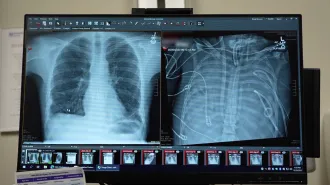Cancer drug limits MS relapses
The anticancer drug rituximab thwarts inflammatory nerve damage in the brain and curbs relapses in people with multiple sclerosis (MS), a study suggests.
Rituximab, marketed as Rituxan by Genentech and Biogen Idec, is a synthetic antibody. The drug has anti-inflammatory as well as anticancer effects. In MS patients, immune-orchestrated inflammation damages myelin fatty sleeves that protect nerves. These inflammatory lesions lead to nerve damage and loss of muscle control.
In the new study, scientists gave 69 patients with the relapsing-remitting form of MS two intravenous infusions of rituximab, while 35 similar patients got placebo infusions. Within 4 weeks, brain scans showed less inflammatory damage to myelin sheaths in those treated with the drug, says study coauthor Stephen Hauser, a neuroimmunologist at the University of California, San Francisco. Scans done 12 to 24 weeks after treatment revealed fewer than one lesion on average in rituximab-treated patients compared with nearly six in the other patients, the team reports in the Feb. 14 New England Journal of Medicine.
Assessments at 6 and 11 months after treatment showed that the rituximab patients had experienced roughly half as many relapses as those on the placebo.
Scientists have long suspected that immune T cells direct myelin damage. But rituximab ignores T cells and instead targets immune B cells. T cells may indeed be at fault, Hauser says, but B cells might play a key role in the cascade of events that cause T cells to trigger MS’s damaging inflammation.







